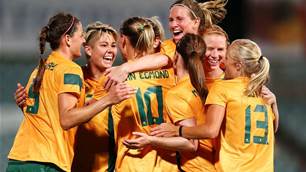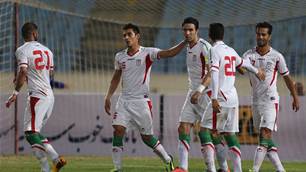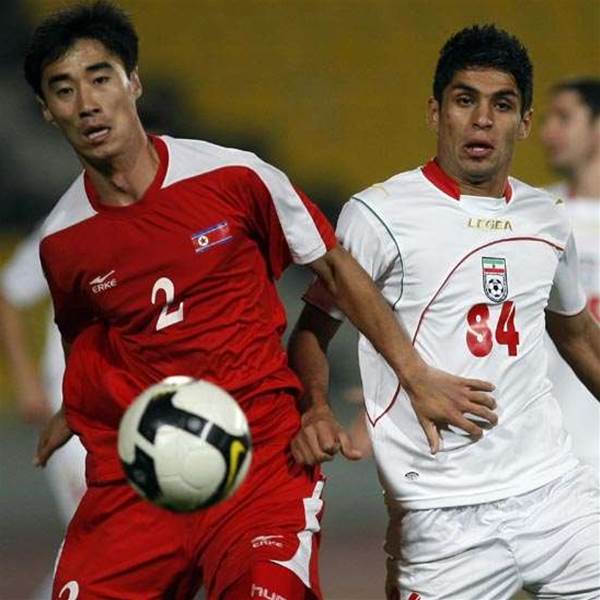D is for 'Death'. A very competitive group features Asian Cup holders Iraq, perennial up-and-downers Iran, World Cup 2010 finalists DPR Korea and strong qualifiers United Arab Emirates. With a number of unpredictable teams, Group D leaves pundits scratching their heads.
Iraq
If you put a bet on Iraq winning the AFC Asian Cup four years ago, you were either a genius or a deranged fool.
As it turned out, the Iraqis made us all look stupid with world sport's feel-good story of 2007. Iraq played fabulous, passionate football willed on by supporters back home desperate for something to cheer in their troubled homeland.
Making a mockery of bizarre preparations and thriving on the adversity, Iraq's footballers galvanised, outclassed Graham Arnold's Socceroos in the group stage and stunned the continent by qualifying for, then winning, the final against tournament favourites Saudi Arabia.
Fast forward to 2010 and the good news is most of 2007's golden generation is back again. Gifted striker and skipper Younis Mahmoud is the focal point up front. Fortuitously, the 27-year-old plies his trade in Qatar with Al Gharafa, so he'll feel right at home.
But there are others who can cause damage for a side currently ranked 94 in the world and eighth in the AFC. Emad Mohamed, 28, from Egyptian powerhouse Zamalek, is a proven goal-scorer at international level - his two goals against Qatar in October a reminder of his danger.
However, this time, it's a different mindset. Four years ago, Iraq played without pressure - just joy for their perilously divided nation. Now, as reigning champions, nothing less than a repeat will be expected in Qatar. And that task is made even tougher in group D (which is D for death, surely?) that features Iran and DPR Korea.
As reigning champions, Iraq were spared qualifying for Qatar 2011 (2007 runners-up Saudi Arabia and third-place finishers Korea Republic also received direct entry). As such, it's a little tougher to judge their form - if indeed that is a much of a guideline given four years ago they went into the Asian Cup with a coach barely a month into the job, unable to train in their homeland and forced to play 'home' games outside Iraq.
Nevertheless, Iraq has been busy in the lead up. The 'Lions of Mesopotamia' qualified for the semi-finals of October's West Asian Football Federation (WAFF) Championships only to lose to Iran. And across the region there have been hit-outs with Jordan, Qatar, Oman, India, and Kuwait. Add to that November's Gulf Cup of Nations and with a couple of games against Syria in December and the Iraqi engine should be purring come Qatar, ready for another upset.
The conditions in Qatar will suit and some will argue Iraq are now nearer their physical peak than in 2007. But it's tough going back-to-back at any major tournament.
Star Man
Playmaker and 2009 Asian Footballer of the Year Nashat Akram is the jewel of the side. He played for Qatari club Al Gharafa in 2009, though after a spell in Holland in 2010 was club-less at time of writing. Akram, 26, will be the creator and if allowed can destroy teams.
The Coach
Wolfgang Sidka - Iraq has struggled to emulate their success since the famous 1-0 win over Saudi Arabia in the 2007 Asian Cup Final. Part of this could be due to the six coaching changes that have taken place over the three years since Jordan Viera won the Asian Cup. Sidka, a vastly experienced coach from several positions since he started in 1988, has admitted he has a tough task ahead of him but remains optimistic: "My mission with the Iraqi team will not be easy, but I will be sure to put together a strong side."
FourFourTwo predicts...
Tough to win it again but national fervour back home can do wonders for the Iraqis.
Iran
The roller-coaster that is Iranian football continues. A disappointing FIFA World Cup 2010 qualification campaign saw 'Team Melli' finish second bottom of their group and bedevilled by coaching upheavals after the short but tumultuous reign of former playing great Ali Daei.
Stability was restored under new coach Afshin Ghotbi as they comfortably negotiated AFC Asian Cup 2011 qualifiers. Iran, the three-time continental champions topped a relatively easy group ahead of Jordan, Thailand and Singapore, conceding just twice in six games, while scoring 11 times and losing once, away to the Jordanians.
Once again, the full weight of expectation from football-mad Iran will be on the national team after an Asian record 12th qualification for the event - a feat they share with South Korea. But Iran's inconsistency is a worry.
At October's West Asian Football Federation Championships in Jordan, a surprise 2-1 loss in the final to the young Kuwaitis brought them back to earth. With recent wins over China and Korea Republic in lead-up friendlies and, predictably, a loss to Brazil in neutral UAE, their up-and-down form continues. Unstable internal football culture aside, there is no denying they produce high quality footballers. Javad Nekounam will be a threat from midfield and skippers the side in the post-Karim Bagheri era. His Osasuna teammate Masoud Shojaei is another to keep an eye on, while one-time Bolton player Andranik Teymourian showed briefly what he can do in the Barclays Premier League.
As for the home-based players, Gholamreza Rezaei and Pejman Nouri from the Iranian Premier League (Saba Battery and Malavan respectively) are also worth keeping tabs on. If Ghotbi's men can muscle their way out of this Group of Death no-one will want to play them as the tournament heads towards its climax. With this in mind, the coach is looking at a certain European mentality to go beyond their third place finish four year ago.
"We should build a team which gradually becomes stronger in each match. Like Germany," he suggests. Perhaps this isn't a bad idea given a number of Iranians have played in the Bundesliga, though that number has dwindled in recent years. And that's what troubling. In recent years, foreign based players were much greater in number than the current squad.
That said, Iran spectacularly derailed Australia's 1998 FIFA World Cup hopes on that night at the MCG in 1997. So whatever you do, don't under-estimate the unpredictable Persians and their fighting spirit - even if on paper this squad doesn't appear as strong as previous incarnations.
Star Man
A defensive midfielder renowned for his distribution and long-range efforts, Javad Nekounan is one half of the Iranian duo currently plying their trade in La Liga with Osasuna. He has well over 100 caps for Iran and at just 30, could very well break Ali Daei's record of 149.
The Coach
Afshin Ghotbi - Ghotbi is one of the few domestic born coaches in the Asian Cup. Despite being raised in Iran, Ghotbi has had a relatively international career; his resume spans the United States and South Korea but most of his success has come in Iran, winning with Iranian domestic league, known as the Gulf Pro Cup, with Persepolis in 2008. He left the club, citing "a conspiracy outside of the club to prevent the team's success" as his reason, signing for the national team in 2009.
FourFourTwo predicts...
Tough to beat but winning the trophy won't be easy with South Korea, Japan and Australia also over in Qatar.
Continues on next page...
Related Articles

Asian Cup - one year to go

Matildas draw world champs Japan in Asian Cup













